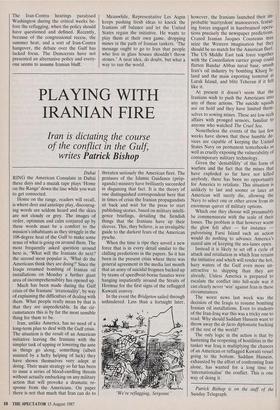PLAYING WITH IRANIAN FIRE
Iran is dictating the course of the conflict in the Gulf,
writes Patrick Bishop
Dubai RING the American Consulate in Dubai these days and a muzak tape plays 'Home on the Range' down the line while you wait to get connected.
Home on the range, readers will recall, is where deer and antelope play, discourag- ing words are seldom heard and the skies are not cloudy or grey. The images of order, optimism and calm conjured up by these words must be a comfort to the mission's inhabitants as they struggle in the 108-degree heat of the Gulf to make some sense of what is going on around them. The most frequently asked question around here is, 'What will the Iranians do next? the second most popular is, 'What do the Americans think they are doing?' Since the Iraqis resumed bombing of Iranian oil installations on Monday a further giant area of incomprehensiblity has opened up.
Much has been made during the Gulf crisis of the Iranians"irrationality', by way of explaining the difficulties of dealing with them. What people really mean by that is that they are unpredictable. In the cir- cumstances this is by far the most sensible thing for them to be.
Iran, unlike America, has no need of a long-term plan to deal with the Gulf crisis. The situation is the result of an American initiative leaving the Iranians with the simpler task of upping or lowering the ante as things go along, something (albeit assisted by a hefty helping of luck) they have shown themselves very adept at doing. Their main strategy so far has been to issue a series of blood-curdling threats without actually embarking on any military action that will provoke a dramatic re- sponse from the Americans. On paper there is not that much that Iran can do to threaten seriously the American fleet. The geniuses of the Islamic Guidance (prop- aganda) ministry have brilliantly succeeded in disguising that fact. It is the theory of one distinguished correspondent here that in times of crisis the Iranian propagandists sit back and wait for the press to start publishing stories, based on military intelli- gence briefings, detailing the fiendish things that the Iranians have up their sleeves. This, they believe, is an invaluable guide to the darkest fears of the American pysche.
When the time is ripe they unveil a new force that is in every detail similar to the chilling predictions in the papers. So it has been in the present crisis where there was general agreement in the media last month that an army of suicidal frogmen backed up by teams of speedboat-borne fanatics were hanging impatiently around the Straits of Hormuz for the first signs of the reflagged Kuwaiti convoy.
In the event the Bridgeton sailed through unhindered. Less than a fortnight later, however, the Iranians launched their im- probable 'martyrdom' manoeuvres, featur- ing forces engaged in harebrained opera- tions precisely the newspaper predictions. Crazed Iranian Jacques Cousteaus may seize the Western imagination but they should be no match for the American fleet. The US Middle East task force together with the Constellation carrier group could flatten Bandar Abbas naval base, smash Iran's oil industry by bombing Kharg Is- land and the main exporting terminal at Larak Island, and blitz Teheran if it felt like it.
At present it doesn't seem that the Iranians wish to push the Americans into any of these actions. The suicide squads are on hold and they have limited them- selves to sowing mines. These are low-tech affairs with pronged sensors, familiar to anyone who watched The Cruel Sea.
Nonetheless the events of the last few weeks have shown that these humble de- vices are capable of keeping the United States Navy on permanent tenterhooks as well as cruelly exposing the vulnerability of contemporary military technology. Given the 'cleniablility' of this form of warfare and the fact that the mines that have exploded so far have not killed anybody, there has been no opportunity for America to retaliate. This situation is unlikely to last and sooner or later an American will surely die, allowing the Navy to select one or other arrow from its enormous quiver of military options.
Which one they choose will presumably be commensurate with the scale of their losses. The problem is that however warm the glow felt after — for instance pulverising Farsi Island such an action would do nothing to advance America's stated aim of keeping the sea-lanes open. Instead it is likely to set off a cycle of attack and retaliation in which Iran retains the initiative and which will render the hot, hazy waters of the Gulf even more un- attractive to shipping than they are already. Unless America is prepared to escalate the conflict into full-scale war it can clearly never 'win' against Iran in these circumstances.
The worst news last week was the decision of the Iraqis to resume bombing Iranian oil installations. Even to students of the Iran-Iraq war this was a tricky one to read. Why should Saddam Hussein want to throw away the de facto diplomatic backing of the rest of the world?
The only logic in the action is that by hastening the reopening of hostilities in the tanker war Iraq is multiplying the chances of an American or reflagged Kuwaiti vessel going to the bottom. Saddam Hussein, exhausted by the effort of confronting Iran alone, has wanted for a long time to `internationalise' the conflict. This is one way of doing it.
Patrick Bishop is on the staff of the Sunday Telegraph.


















































 Previous page
Previous page